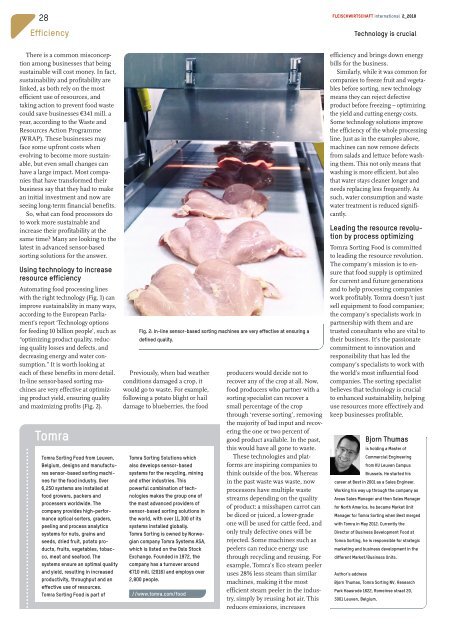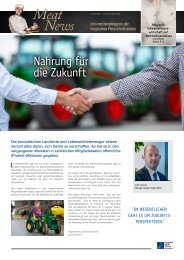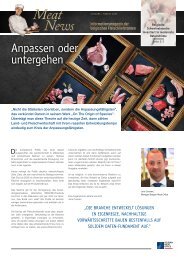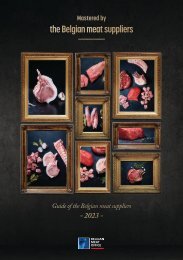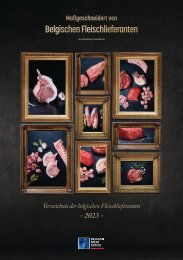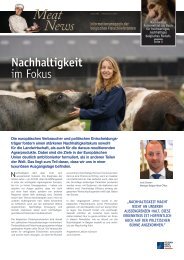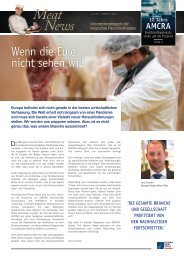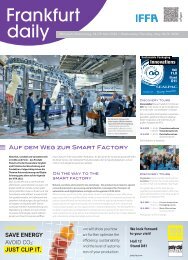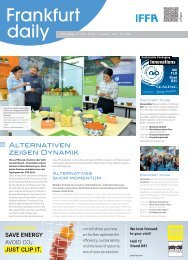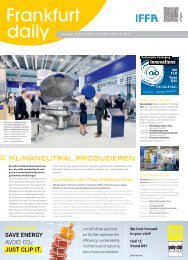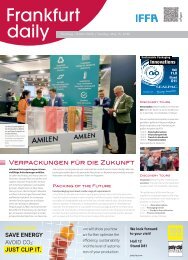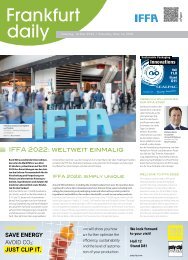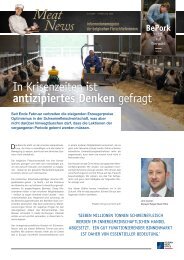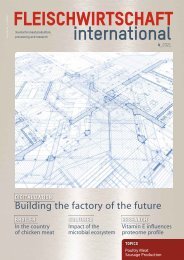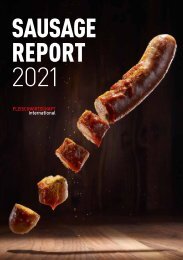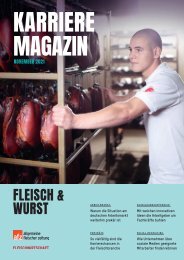FLEISCHWIRTSCHAFT international 2/2018
You also want an ePaper? Increase the reach of your titles
YUMPU automatically turns print PDFs into web optimized ePapers that Google loves.
...............................................<br />
28<br />
Fleischwirtschaft <strong>international</strong> 2_<strong>2018</strong><br />
Efficiency<br />
Technology is crucial<br />
There is acommon misconception<br />
among businesses that being<br />
sustainable will cost money.Infact,<br />
sustainability and profitability are<br />
linked, as both rely on the most<br />
efficient use of resources, and<br />
taking action to prevent food waste<br />
could save businesses €341mill. a<br />
year,according to the Waste and<br />
Resources Action Programme<br />
(WRAP). These businesses may<br />
face some upfront costs when<br />
evolving to become more sustainable,<br />
but even small changes can<br />
have alarge impact. Most companies<br />
that have transformed their<br />
business say that they had to make<br />
an initial investment and now are<br />
seeing longterm financial benefits.<br />
So,what can food processors do<br />
to work more sustainable and<br />
increase their profitability at the<br />
same time? Many are looking to the<br />
latest in advanced sensorbased<br />
sorting solutions for the answer.<br />
Using technology to increase<br />
resource efficiency<br />
Automating food processing lines<br />
with the right technology (Fig. 1) can<br />
improve sustainability in many ways,<br />
according to the European Parliament’s<br />
report ‘Technology options<br />
for feeding 10 billion people’, such as<br />
“optimizing product quality,reducing<br />
quality losses and defects, and<br />
decreasing energy and water consumption.”<br />
It is worth looking at<br />
each of these benefits in more detail.<br />
Inline sensorbased sorting machines<br />
are very effective at optimizing<br />
product yield, ensuring quality<br />
and maximizing profits (Fig. 2).<br />
Tomra<br />
Tomra Sorting Food from Leuven,<br />
Belgium, designs and manufactures<br />
sensorbased sorting machines<br />
for the food industry.Over<br />
6,250 systems are installed at<br />
food growers, packers and<br />
processers worldwide. The<br />
company provides highperformance<br />
optical sorters, graders,<br />
peeling and process analytics<br />
systems for nuts, grains and<br />
seeds, dried fruit, potato products,<br />
fruits, vegetables, tobacco,<br />
meat and seafood. The<br />
systems ensure an optimal quality<br />
and yield, resulting in increased<br />
productivity, throughput and an<br />
effective use of resources.<br />
Tomra Sorting Food is part of<br />
Fig. 2: Inline sensorbased sorting machines are very effective at ensuring a<br />
defined quality.<br />
Previously,when bad weather<br />
conditions damaged acrop, it<br />
would go to waste. Forexample,<br />
following apotato blight or hail<br />
damage to blueberries, the food<br />
Tomra Sorting Solutions which<br />
also develops sensorbased<br />
systems for the recycling, mining<br />
and other industries. This<br />
powerful combination of technologies<br />
makes the group one of<br />
the most advanced providers of<br />
sensorbased sorting solutions in<br />
the world, with over 11,300 of its<br />
systems installed globally.<br />
Tomra Sorting is owned by Norwegian<br />
company Tomra Systems ASA,<br />
which is listed on the Oslo Stock<br />
Exchange. Founded in 1972, the<br />
company has aturnover around<br />
€710 mill. (2016)and employs over<br />
2,800 people.<br />
//www.tomra.com/food<br />
producers would decide not to<br />
recover any of the crop at all. Now,<br />
food producers who partner with a<br />
sorting specialist can recover a<br />
small percentage of the crop<br />
through ‘reverse sorting’, removing<br />
the majority of bad input and recovering<br />
the one or two percent of<br />
good product available. In the past,<br />
this would have all gone to waste.<br />
These technologies and platforms<br />
are inspiring companies to<br />
think outside of the box. Whereas<br />
in the past waste was waste, now<br />
processors have multiple waste<br />
streams depending on the quality<br />
of product: amisshapen carrot can<br />
be diced or juiced, alowergrade<br />
one will be used for cattle feed, and<br />
only truly defective ones will be<br />
rejected. Some machines such as<br />
peelers can reduce energy use<br />
through recycling and reusing. For<br />
example, Tomra’s Eco steam peeler<br />
uses 28% less steam than similar<br />
machines, making it the most<br />
efficient steam peeler in the industry,simply<br />
by reusing hot air.This<br />
reduces emissions, increases<br />
efficiency and brings down energy<br />
bills for the business.<br />
Similarly,while it was common for<br />
companies to freeze fruit and vegetables<br />
before sorting, new technology<br />
means they can reject defective<br />
product before freezing –optimizing<br />
the yield and cutting energy costs.<br />
Some technology solutions improve<br />
the efficiency of the whole processing<br />
line. Just as in the examples above,<br />
machines can now remove defects<br />
from salads and lettuce before washing<br />
them. This not only means that<br />
washing is more efficient, but also<br />
that water stays cleaner longer and<br />
needs replacing less frequently.As<br />
such, water consumption and waste<br />
water treatment is reduced significantly.<br />
Leading the resource revolution<br />
by process optimizing<br />
Tomra Sorting Food is committed<br />
to leading the resource revolution.<br />
The company’s mission is to ensure<br />
that food supply is optimized<br />
for current and future generations<br />
and to help processing companies<br />
work profitably.Tomra doesn’t just<br />
sell equipment to food companies;<br />
the company’s specialists work in<br />
partnership with them and are<br />
trusted consultants who are vital to<br />
their business. It’s the passionate<br />
commitment to innovation and<br />
responsibility that has led the<br />
company’s specialists to work with<br />
the world’s most influential food<br />
companies. The sorting specialist<br />
believes that technology is crucial<br />
to enhanced sustainability,helping<br />
use resources more effectively and<br />
keep businesses profitable.<br />
Bjorn Thumas<br />
is holding aMaster of<br />
Commercial Engineering<br />
from KU Leuven Campus<br />
Brussels. He started his<br />
career at Best in 2001asaSales Engineer.<br />
Working his way up through the company as<br />
Areas Sales Manager and then Sales Manager<br />
for North America, he became Market Unit<br />
Manager for Tomra Sorting when Best merged<br />
with Tomra in May 2012.Currentlythe<br />
Director of Business Development Food at<br />
Tomra Sorting, he is responsible for strategic<br />
marketing and business development in the<br />
different Market/Business Units.<br />
Author’s address<br />
Bjorn Thumas, Tomra Sorting NV, Research<br />
Park Haasrode 1622, Romeinse straat 20,<br />
3001Leuven, Belgium.


